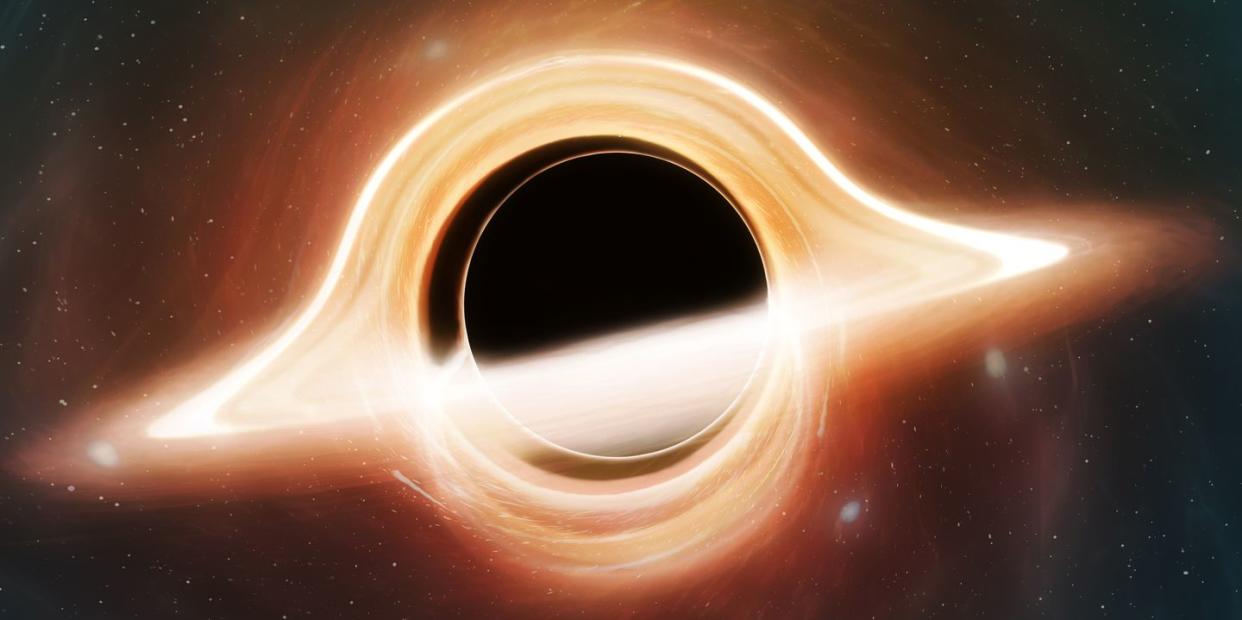It's Logical That Aliens Are Using Black Holes As Computers, Scientists Say

For decades, scientists have searched the skies and theorized countless reasons why humans seem to be alone in the known galaxy.
A new preprint paper suggests that advanced alien civilizations could harness black holes for quantum computers.
Focusing our search for tell-tale signs of these highly energetic artificial black holes could point us toward an advanced alien civilization.
If you want to find an alien, you need to think like an alien—preferably a smart one. That’s the advice of a new study that suggests scientists searching for extraterrestrials (a.k.a. organizations like SETI) might want to focus their attention on emissions from black holes. Why? Because according to these scientists, any respectable super-advanced civilization wouldn’t be caught dead without a black hole quantum computer.
One of the most unwavering questions lying at the heart of SETI since its founding in 1984 is what, exactly, should we be looking for when it comes to finding evidence of an alien civilization. The original idea was to search for electromagnetic radiation (e.g. gamma rays or radio waves) as a signal—the famous “Wow signal” was detected by a radio telescope, for example.
However, physicists Gia Dvali from the Max Planck Institute and Zaza Osmanov from the Free University of Tbilisi think it’s worth considering the possibility that advanced civilizations would use black holes as quantum computers.
“Black holes are the most efficient capacitors of quantum information. It is thereby expected that all sufficiently advanced civilizations ultimately employ black holes in their quantum computers,” the authors write in the paper, which was posted on arXiv and hasn’t been peer reviewed. “The alien quantum computers will radiate in ordinary particles such as neutrinos and photons within the range of potential sensitivity of our detectors.”
For years, it’s been theorized that the kooky spacetime antics around black holes act similar to quantum computers. Quantum computation works with a series of mirrors, beam splitters, and prisms that alter the phase of photons to be mapped to 0s and 1s. Quantum information encoded in beams of light that approach a rotating black hole experience a similar process.
This method of searching for aliens also has another distinct advantage: its foundational science is truly universal.
“No matter how advanced a civilization is or how different is their particle composition and chemistry from ours, we are unified by laws of quantum physics and gravity,” the authors told Universe Today. “These laws tell us that the most efficient storers of quantum information are black holes.”
A few theories have guessed at the general technological trajectories of most civilizations. The Kardashev Scale, proposed by Soviet astronomer Nikolai Kardashev, suggested that Type 1 civilizations could harness all the power from their host star on their planet (right now we’re like 0.75). Type 2 species could harness the entire power of their stars (think Dyson spheres), and finally, Type 3 civilizations could harness the power of their entire galaxy. However, another scale called the Barrow Scale takes this big idea and applies it to the minuscule—things like atoms and quantum mechanics.
Because scientists like Dvali and Osmanov believe black holes are the best quantum computers around, it’s likely that any Type-III civilization should be capable of harnessing them. These black holes would be artificially created in subatomic collisions in high-energy accelerators. These miniature black holes would also resonate high-energy Hawking radiation (the radiation emitted by black holes near its event horizon) as well as the “factories” used to create them.
Without getting too far down the quantum physics rabid hole, this essentially means neutrinos and photons emanating from these highly energetic black hole quantum computers should be detectable by our instruments like the IceCube Neutrino Observatory in Antarctica.
“Up until now, we have completely overlooked a natural direction for SETI in form of high energy neutrinos and other particles produced by the Hawking radiation of artificial black holes,” the study authors told Universe Today.
So maybe the universe is filled with the buzzing signals of black hole quantum computers storing data with technology unfathomable to our simple Type-0.75 minds—and we’ve just been tuned in to the wrong channel.
You Might Also Like
